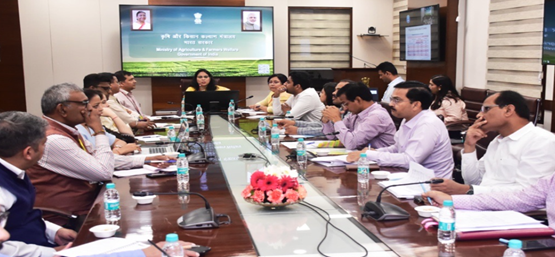Dept of Agriculture & Farmers’ Welfare conducts stakeholder consultation on Kharif 2024 crop production outlook
According to initial ground-level reports presented by the stakeholders, Rice and Maize production is expected to be promising for kharif 2024.
In continuation of the stakeholder consultation initiative held during the early week of this month, the Department of Agriculture and Farmers’ Welfare (DA&FW) under the Chairmanship of Advisor (AS & DA) Ruchika Gupta conducted second round of stakeholders’ consultation at Krishi Bhawan, New Delhi. The focus of discussion was production scenario of cereals and oilseeds along with cotton and sugarcane, ahead of the release of first advance estimates for the Kharif 2024 season, which are scheduled for October 2024. Key stakeholders, including CRISIL Research, Agriwatch, India Pulses and Grain Association (IPGA), Indian Oilseed and Produce Export Promotion Counsil (IOPEPC), Indian Sugar Mills Association (ISMA), Indian Institute of Oilseed Research (IIOR), Cotton Corporation of India (CCI), Department of Food & Public Distribution (DFPD), Crop Development Directorates of Wheat, Sugarcane, Rice, Oilseeds and Cotton and Department of Consumer affairs (DOCA) were present and actively engaged in the discussions.
The primary objective of this consultation was to gather crucial insights and early assessments from stakeholders regarding the current production outlook of crops for the Kharif 2024 season. These contributions will be integral to formulating the first advance estimates of these agricultural crops. During the meeting, participants shared valuable expertise on a range of issues, including crop condition assessments and the estimation methodologies. According to initial ground-level reports presented by the stakeholders, the Rice & Maize production is expected to be promising for the upcoming season. However, acreage of cotton is expected to be lesser in this season due to crop diversification.
The consultation concluded with stakeholders unanimously emphasizing the importance of ongoing collaboration and consistent information sharing between the Ministry and industry experts. The initiative marks a significant advancement toward achieving greater precision in crop production forecasting.
According to initial ground-level reports presented by



